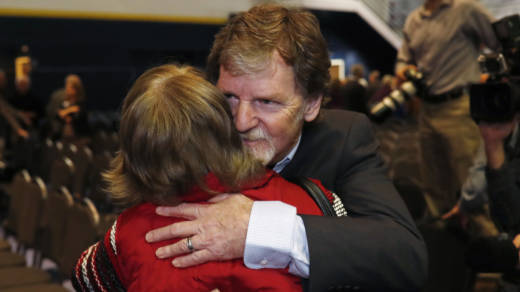The court also said that the Colorado Civil Rights Division, responsible for enforcing the state's anti-discrimination laws, also showed hostility to Phillips' beliefs because of its inconsistency in applying the law.
"The commission ruled against Phillips in part on the theory that any message on the requested wedding cake would be attributed to the customer, not to the baker," the court said. "Yet the division did not address this point in any of the cases involving requests for cakes depicting anti-gay marriage symbolism."
Despite the opinion's sharp criticism of the Colorado state agencies' handling of the wedding-cake dispute, Kennedy's opinion makes it clear that Monday's ruling is a narrow one -- applying only to the present case.
"The outcome of cases like this in other circumstances must await further elaboration in the courts, all in the context of recognizing that these disputes must be resolved with tolerance, without undue disrespect to sincere religious beliefs, and without subjecting gay persons to indignities when they seek goods and services in an open market," the opinion concluded.
Justices Ruth Bader Ginsberg and Sonia Sotomayor dissented. The court's four most conservative justices, including Chief Justice John Roberts, concurred with the decision, offering different rationales for the future.
Every Supreme Court term, there is at least one case that gets people's blood up. A case on which just about everyone has an opinion, often a ferocious opinion. This is one of them.
This case began when Charlie Craig and Dave Mullins were organizing a wedding reception for themselves in Lakewood, Colorado, and were referred by their wedding planner to the Masterpiece Cakeshop, known in particular for its wedding cakes.
When Mullins, along with Craig and his mother, arrived at the shop, bakery owner Jack Phillips greeted them politely, but, as soon as he realized who the wedding cake was for, Phillips instantly knew this was "not a cake that I can make." And he informed them that he did not make cakes for same-sex weddings.
Phillips believes that same-sex marriages are sinful, that marriage is to be between a man and a woman. "I don't believe that Jesus would have made a cake if he had been a baker," he said on ABC's The View. "I'm not judging these two gay men," he continued, "I'm just trying to preserve my right as an artist to decide which artistic endeavors I'm going to do and which ones I'm not."
That, however, was not how Charlie Craig felt. "Man, it was just really humiliating," Craig said, noting that he was particularly embarrassed for this to have happened in front of his mother.
As the couple would soon learn, Colorado, like most states, has a state anti-discrimination law for businesses that are open to the public. Colorado bars discrimination based on race, religion, gender and sexual orientation. So Mullins and Craig filed a complaint with the state Commission on Civil Rights, which ruled in their favor, as did the state Supreme Court. The baker, Jack Phillips, appealed to the U.S. Supreme Court.
For a half-century, the high court has upheld public accommodations laws against challenges brought by people who claim that their sincerely held beliefs — religious and otherwise — prevent them from serving customers on an equal basis.
Copyright 2018 NPR. To see more, visit http://www.npr.org/.
9(MDAxOTAwOTE4MDEyMTkxMDAzNjczZDljZA004))

9(MDAxOTAwOTE4MDEyMTkxMDAzNjczZDljZA004))
